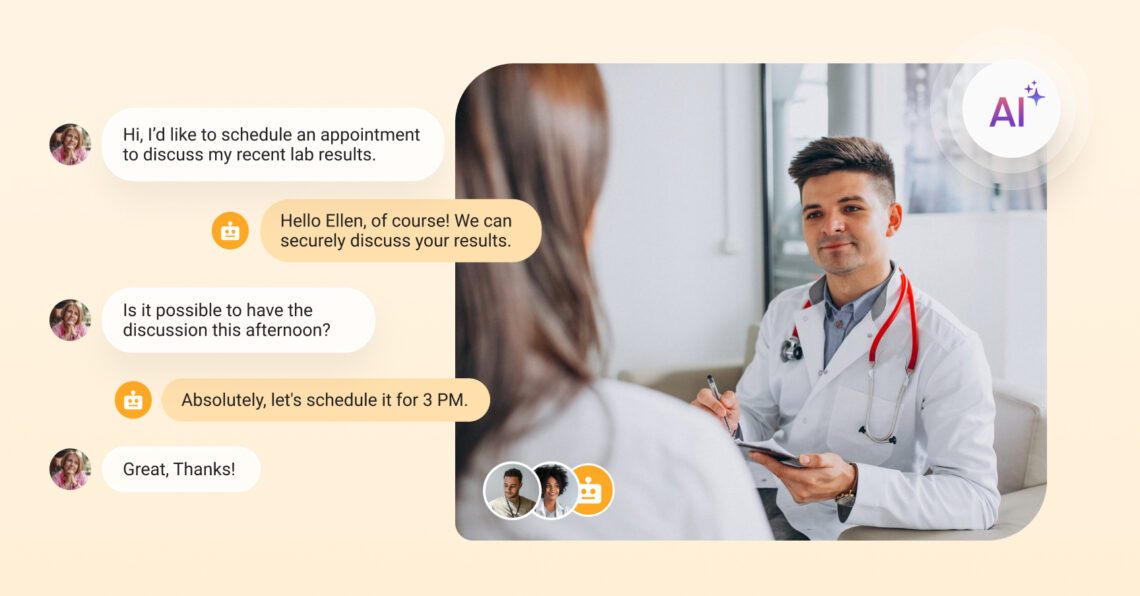Imagine someone in serious pain trying to reach their doctor late at night. Or think about a busy professional who just can’t seem to book a dental appointment because every clinic closes after 5 pm.
This is exactly where AI chatbots step in, helping healthcare providers avoid losing patients simply because they’re unavailable.
Healthcare is complex, time-sensitive, and deeply personal. Traditional communication channels often fall short, leaving patients frustrated and uncertain. AI chatbots are changing that, offering immediate, intelligent, and compassionate medical support when it’s needed the most.
This blog post explores how AI chatbots transform healthcare communication and provides insights into their potential to reshape patient experiences.
Table of contents
- What is an AI Chatbot for healthcare?
- Why AI chatbots matter in modern healthcare
- What should you look for in AI chatbots for healthcare solutions?
- How to use AI Chatbots in healthcare businesses: 8 use cases to explore in 2025
- Implementing AI chatbot for healthcare businesses: Ethical considerations
- Conclusion
- FAQs about AI chatbots for healthcare
- Step up multi-location patient engagement with Birdeye Chatbot AI
What is an AI Chatbot for healthcare?
An AI chatbot for healthcare is an intelligent virtual assistant powered by GenAI (Generative Artificial Intelligence). The chatbot provides medical information, support, and personalized patient interactions using Natural Language Processing and advanced conversational technology.
Why AI chatbots matter in modern healthcare
The healthcare industry is rapidly expanding, but traditional communication methods often fall short of meeting patient expectations. AI chatbots bridge this gap by allowing healthcare businesses to provide 24/7 accessibility, improve operational efficiency, personalize communication, and scale support without straining resources.
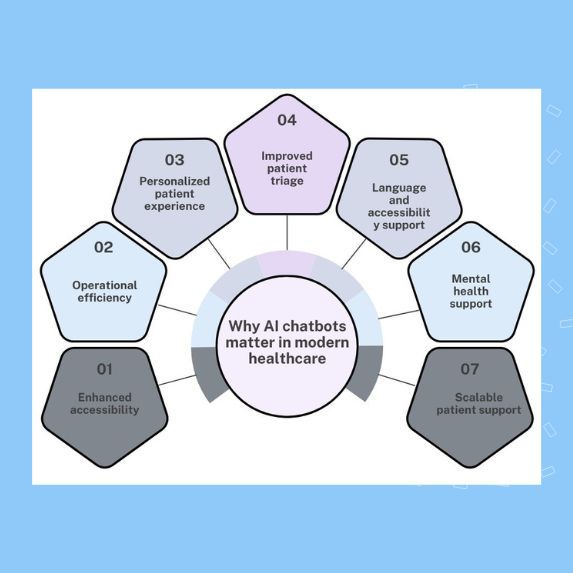
Let us take a closer look at the benefits of AI healthcare chatbots in detail.
Enhanced accessibility
AI chatbots provide immediate medical information 24/7, eliminating wait times and reducing patient anxiety. A parent can quickly get information about a child’s fever at 2 AM, understanding whether to seek immediate medical attention or manage care at home.
This kind of instant access to medical information can prevent unnecessary emergency room visits and provide critical first-line health support when healthcare providers are not immediately available.
Operational efficiency
AI chatbots significantly decrease administrative overhead and streamline patient communication processes. A single AI chatbot can simultaneously handle hundreds of patient inquiries, replacing multiple customer service representatives and reducing staffing costs.
Healthcare organizations can save thousands of dollars annually by automating routine communications. This also allows medical staff to focus on complex patient care and critical medical tasks.
Personalized patient experience
AI chatbots provide customized health information based on individual patient history and preferences. For example, someone with diabetes receives personalized medication reminders, nutrition advice, and blood sugar tracking recommendations specific to their medical profile.
Personalized communication increases patient engagement, improves treatment adherence, and creates a more connected healthcare experience that feels individualized and attentive.
Implementing AI for healthcare chatbots and virtual assistants enables businesses to build patient portals for a personalized experience at all touchpoints.
Improved patient triage
AI chatbots can efficiently prioritize patient needs and direct them to appropriate medical resources. The chatbot assesses symptom severity, distinguishing between conditions requiring immediate emergency care versus those manageable through telehealth or routine consultation.
This kind of efficient triage helps reduce overcrowding in emergency rooms, ensures critical cases get attention faster, and makes better use of healthcare resources overall.
Language and accessibility support
When clinics use GenAI for healthcare chatbots and virtual assistants, they can accommodate patients who need to communicate in multiple languages or who require other accessibility accommodations.
Birdeye’s Chatbot AI provides multi-lingual support, which means:
- A Spanish-speaking patient can receive medical guidance in their native language
- A patient with hearing impairments uses text-based interaction
- And so much more
By breaking down language and accessibility barriers, chatbots ensure that everyone has equal access to healthcare, improving understanding and supporting patients from all backgrounds.
Mental health support
AI chatbots provide initial mental health screening, coping strategies, and emotional support. The chatbot offers:
- Anonymous, judgment-free initial mental health assessments
- Resources and guiding users towards professional help when needed
With immediate, confidential mental health support, chatbots can remove stigma, encourage early intervention, and provide critical emotional resources.
Scalable patient support
AI chatbots can simultaneously handle multiple patient interactions without losing quality. During a health crisis or pandemic, chatbots can simultaneously provide consistent, accurate information to thousands of patients.
This scalability ensures patients have access to reliable medical guidance, no matter how busy the system gets or what challenges arise.
What should you look for in AI chatbots for healthcare solutions?
Not all AI chatbots work the same way. A multi-location healthcare business requires the most efficient AI healthcare chatbots to streamline operations communication standards. Knowing how to look for help you choose the best AI chatbot for healthcare businesses and boost efficiency.
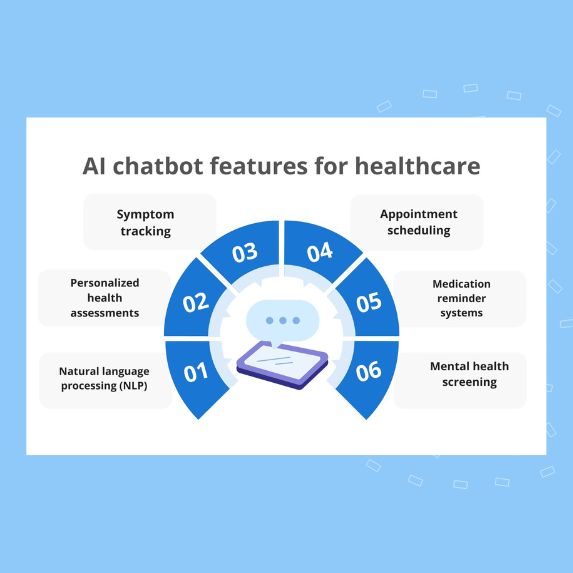
Here are some qualities that the best AI chatbots for healthcare businesses possess:
- Natural language processing
- Personalized health assessments
- Symptom tracking
- Appointment scheduling management
- Medication reminders systems
- Mental health screenings
Let us explore these features in detail.
1. Natural language processing (NLP)
AI chatbots with natural language processing capabilities understand, interpret, and respond to human communication with remarkable accuracy and context awareness. This helps your healthcare business to:
- Break down complex medical communication barriers
- Interpret nuanced patient expressions
- Provide human-like, empathetic interactions
- Optimize resources by avoiding manual responses, misinterpretation of patient needs, and scale customer support without additional staffing
The Impact: NLP allows chatbots to understand colloquial medical descriptions. Instead of rigid, keyword-based responses, the system comprehends statements like "I feel awful, and my head is killing me" by analyzing context, tone, and potential medical implications.
2. Personalized health assessments
Advanced AI chatbots can conduct comprehensive, individualized health evaluations by analyzing patient-specific data, medical history, and real-time health inputs. With this, you can:
- Create tailored health insights
- Identify potential health risks early
- Provide customized health recommendations
- Streamline preliminary health screenings
- Set up proactive health management
The impact: Unsure patients can receive preliminary health assessments from their homes by analyzing medical history, current medications, lifestyle factors, and genetic predisposition. This encourages them to seek help from the right resources.
3. Symptom tracking
With AI chatbots, healthcare companies can continuously monitor and analyze patient-reported symptoms, creating comprehensive health narratives and trend identification.
This enables you to monitor patients remotely, detect potential health crises beforehand, and intervene when necessary. Hospitals and clinics can significantly improve patient experience with symptom-tracking chatbots in the areas of:
- Chronic disease management
- Post-surgical recovery monitoring
- Medication effectiveness assessment
- Trend analysis for preventive care
The impact: AI chatbots can ensure patients check in regularly, track pain levels, and set up alerts for any possible complication. This can streamline post-surgery follow-up, help patients take charge of their health, and help mobility-challenged patients seek immediate care.
4. Appointment scheduling
AI chatbots integrated with intelligent scheduling systems help manage patient appointments with maximum efficiency and minimal human intervention. They equip your healthcare practice with the following:
- 24/7 booking capabilities
- Reduced administrative overhead
- Minimized scheduling conflicts
- Lesser manual scheduling processes
- Reduce no-show rates
- Maximize productivity
The impact: AI chatbots can manage appointments for multiple specialties across multiple locations. This ensures 24/7 booking, intelligent slot allocation, appointment reminders, and patient data collection from a single source.
5. Medication reminder systems
Healthcare AI chatbots offer sophisticated medication management platforms for patient adherence and optimal treatment follow-through. They can send periodic reminders, converse with patients to set up follow-ups and clarify medication-related queries.
The impact: Advanced AI systems support elderly patients with complex medication regimens by providing personalized medication schedules, interaction warnings, and updating physicians on progress.
6. Mental health screening
Patients in a mental health crisis need empathetic, immediate, and systematic intervention. AI chatbots can enable advanced psychological assessment tools, providing initial mental health evaluations and support resources.
AI chatbots can provide:
- Anonymous assessment
- Comprehensive psychological questionnaires
- Risk level determination
- Referral recommendation
The impact: 1 in 5 adults experience mental health issues and face difficulty in finding a diagnosis or adequate care. AI screening chatbots can help underserved populations and reduce mental health treatment delays.
Streamline patient engagement with AI chatbots
Want to see the impact of Birdeye on your business? Watch the Free Demo Now.
How to use AI Chatbots in healthcare businesses: 8 use cases to explore in 2025
AI chatbots have several applications in healthcare, including but not limited to appointment management, telehealth support, patient onboarding, document collection, lead management, patient follow-up, insurance processing, and feedback collection.
Let us explore these real-time cases of AI chatbots in your healthcare business.
1. Appointment management
Many healthcare businesses struggle to manage patient appointments, from creating bookings, setting up recurring schedules, automating reminders, and more. These challenges also increase as clinics scale locations and have to manage a higher patient volume.
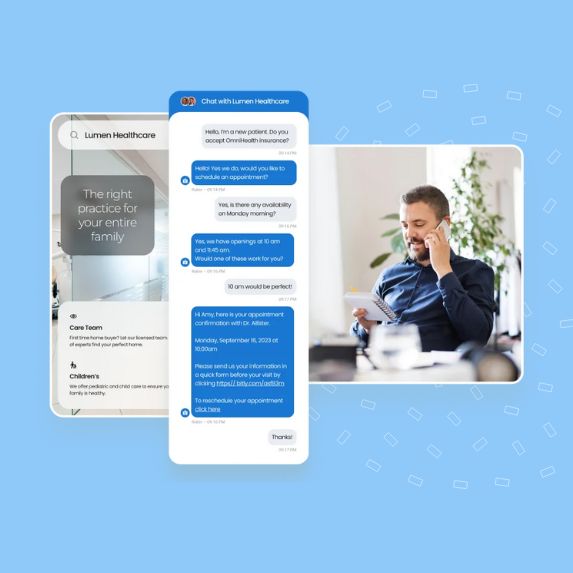
AI chatbots streamline appointment management by:
- Enabling 24/7 appointment booking by allowing patients to use self-service options via the business website
- Sending automated reminders to avoid no-shows
- Allowing easy rescheduling to reduce cancellations
- Integrating with existing calendar systems to provide visibility to doctors and clinic administrators
- Intelligent doctor allocation based on patient requirements
- Provide multi-lingual support via NLP, allowing you to cater to a diverse audience.
AI chatbots for healthcare appointment management help analyze patient behavior, shape strategies for higher lead conversion, and streamline operations across multiple locations.
2. Telehealth support
Remote consultations and telehealth services are fast becoming standard across most healthcare industries. However, not all clinics or hospitals can provide that service, and extending staff for 24/7 consultations can be expensive.
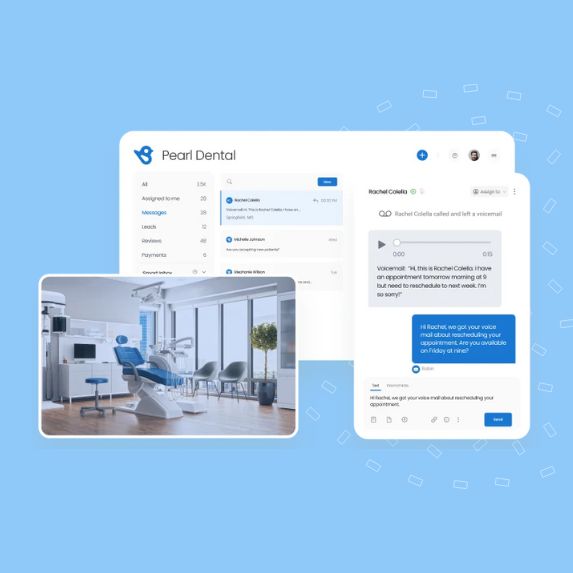
AI chatbots can step in and help your clinics manage a higher volume of patients with:
- Pre-consultation screening
- Technical support for virtual visits
- Collecting preliminary patient information
- Guiding patients through telehealth platform navigation
- Providing post-consultation follow-up
3. Patient onboarding
Clinics spend valuable time and resources collecting patient information, completing onboarding, and explaining the processes over and over to new patients.
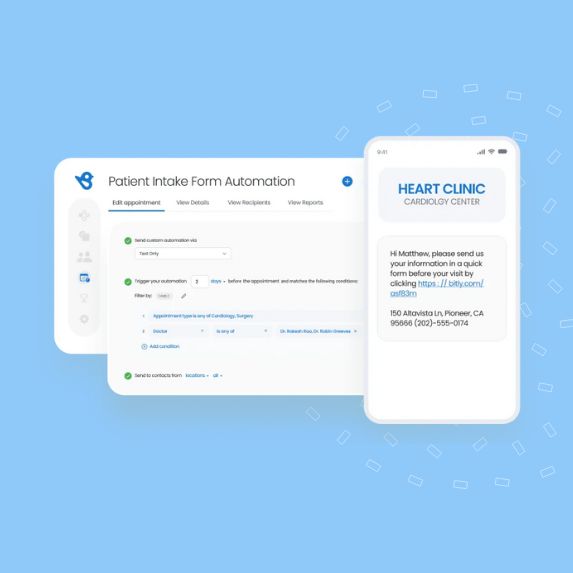
GenAI chatbots can simplify the patient intake and onboarding process by automating repetitive tasks such as:
- Collecting comprehensive patient history
- Guiding new patients through registration
- Explaining healthcare facility protocols
- Verifying insurance information
Pro Tip: Using NLP-based GenAI chatbots is the most efficient way to simplify patient onboarding. New patients can complete complex registration forms conversationally, reducing administrative burden and improving data accuracy.
4. Document collection and management
AI chatbots can ease the strain on administrative staff members and streamline document management across locations. You can also reduce manual mistakes, incomplete follow-ups, and data security threats to medical information.
AI chatbots can enable:
- Automated document request systems
- Secure file upload interfaces
- Tracking missing medical records
- Providing clear instructions for document submission
- Sending reminders for incomplete documentation
Pro Tip: Ensure the AI chatbot tools you use provide end-to-end encryption, data security, and privacy protocols to avoid legal implications.
5. Lead management for healthcare providers
Supporting healthcare marketing and patient acquisition by:
- Capturing potential patient inquiries
- Qualifying medical service leads
- Providing initial information about services
- Scheduling initial consultations
- Tracking patient interest patterns
Advantage: Converts website visitors into potential patients through intelligent, personalized interactions.
6. Patient follow-up management
Keeping patients engaged and committed to their care is one of the biggest challenges for any healthcare business. Busy lives make it hard for them to reach out during office hours, deterring them from setting up appointments, following up with queries, or even getting a few diagnostic tests done.
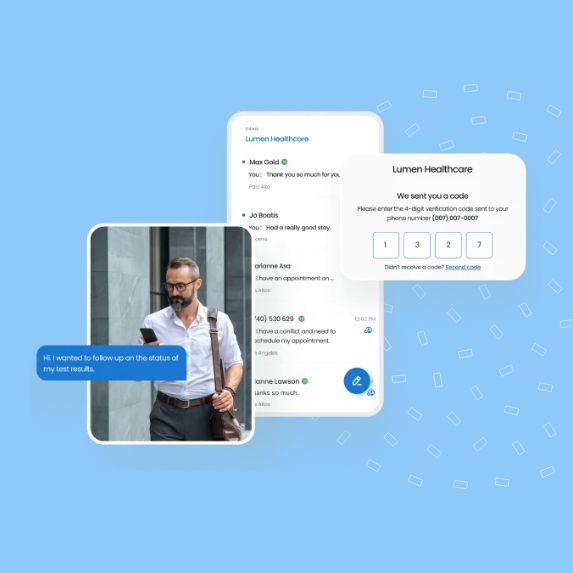
AI chatbots ensure the clinic’s extended availability, greater ease of conversation, and active patient engagement.
AI chatbots can handle:
- Post-treatment check-in messages
- Medication adherence tracking
- Recovery progress monitoring
- Collecting patient satisfaction data
- Scheduling necessary follow-up appointments
7. Insurance processing support
Delay in processing insurance information, including claims, policy details, and reimbursement procedures, can impede healthcare. For a multi-location healthcare business, relying only on your staff to manage them can be challenging.
The process usually involves multiple phone calls and messages – which the AI chatbot can quickly take over.
AI chatbots can help in simplifying complex insurance interactions by:
- Verifying insurance coverage
- Explaining benefit details
- Guiding patients through claim processes
- Providing cost estimation
- Answering insurance-related queries
8. Feedback collection
Patient feedback is an essential part of healthcare business excellence. Feedback insights explain patient preferences in treatment options, payment methods, communication channels, and more.
However, the traditional survey methods do not always yield the best results. Conversational AI chatbots can help you transform feedback collection with pulse surveys, AI-generated responses, and more.
Some of the functions that AI chatbots can aid with include:
- Automated satisfaction surveys
- Real-time feedback collection
- Sentiment analysis
- Identifying areas of improvement
- Providing immediate response mechanisms
Implementing AI chatbot for healthcare businesses: Ethical considerations
While AI chatbots can significantly improve how your healthcare business functions, implementation is not straightforward, businesses must be mindful of HIPAA considerations, ethical regulations, limitations, and data privacy compliance requirements.
Before choosing an AI chatbot for your healthcare business, ensure that:
- You train the chatbot on accurate medical data and allow for human oversight to avoid any hallucination in responses
- Constantly monitor the reports from the AI chatbot to circumvent any ethical violations
- The tool adheres to HIPAA guidelines
- You get explicit consent from the patients before the AI chatbot begins the conversation.
- Your team and patients understand the limitations of the AI chatbot in diagnosis, interpreting symptoms, and providing medical information.
Conclusion
Integrating AI chatbots in healthcare represents a transformative approach to patient care and medical support. These intelligent virtual assistants are not just technological innovations but powerful tools that can dramatically improve accessibility, efficiency, and personalization in healthcare delivery.
From providing 24/7 medical support to mental health screening and streamlining administrative processes, AI healthcare chatbots offer comprehensive solutions to many healthcare communication challenges.
However, successfully implementing these technologies requires a thoughtful and ethical approach. Healthcare providers must prioritize patient privacy, ensure accurate medical information, and maintain human oversight.
As we move forward, AI chatbots will likely become an increasingly integral part of healthcare ecosystems, bridging communication, support, and patient engagement gaps while maintaining the highest standards of care and compassion.
FAQs about AI chatbots for healthcare
Reputable healthcare chatbots prioritize data protection, implementing robust encryption and following strict HIPAA guidelines to ensure patient information remains confidential and secure.
No, AI chatbots are designed to complement, not replace, healthcare professionals. They provide support, initial assessments, and guidance while ensuring human medical expertise remains central to patient care.
Top-tier AI chatbots utilize extensive medical databases and machine learning algorithms, continuously improving accuracy through advanced training and expert medical input.
Healthcare chatbots can offer the following:
– General health information
– Symptom checking
– Medication details
– Wellness tips
– Basic medical guidance
Many chatbot solutions offer scalable pricing, from free basic versions to comprehensive enterprise packages tailored to specific healthcare needs.
Step up multi-location patient engagement with Birdeye Chatbot AI
Delivering excellence across patient communication, engagement, and overall experience across locations can significantly challenge healthcare businesses. Working with an AI healthcare chatbot can help smoothen operation hiccups, improve patient care, and generate more leads.
The Birdeye Chatbot AI is tailored for healthcare businesses such as clinics, hospitals, and treatment centers. The tool is HIPAA-compliant, provides end-to-end encryption, and always assures data privacy.
With Birdeye Chatbot AI, your healthcare business can:
- Provide 24/7 self-service with unique, personalized answers for every patient/web visitor query
- Handle more patient interactions, manage multiple conversations, capture leads, and route messages to live agents simultaneously
- Train the Chatbot AI on top-performing SEO content, medical data, patient behavior manuals, and more for factual responses
- Manage customer conversations from a smart inbox for faster organization
- Write professional responses with a single click with GenAI
- Take the conversations to SMS to keep the interaction going
- Analyze chat performance, generating insights to improve success across locations
- Scale support across growing locations
Birdeye Chatbot AI unlocks excellent opportunities for your healthcare business to elevate patient experience without straining resources.
Intrigued? Watch a free demo to learn more.

Originally published
